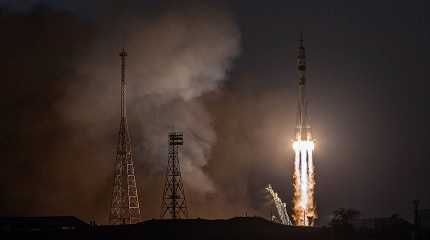
MOSCOW, January 11. /TASS/: The Soyuz MS-23 spacecraft will launch in unpiloted mode to the International Space Station (ISS) on February 20 to return the crew to Earth, Roscosmos Chief Yury Borisov said on Wednesday, following the results of a state commission meeting.
"The state commission has made a decision to launch the Soyuz MS-23 spacecraft in unpiloted mode on February 20, 2023 with the delivery of supplies to the International Space Station," Borisov said.
The launch of the Soyuz MS-23 spacecraft was initially scheduled for March 16 to carry the crew of the 69th long-term space expedition consisting of Roscosmos cosmonauts Oleg Kononenko, Nikolay Chub and NASA astronaut Loral O’Hara to the orbital outpost. After the emergency aboard the Soyuz MS-22 spacecraft docked to the International Space Station, two versions of launching a new spaceship were discussed: its launch in piloted mode with one cosmonaut or in crewless mode, the Roscosmos chief said.
"The piloted flight with one cosmonaut requires the spacecraft’s upgrade, the issuance of documentation and the cosmonaut’s additional training and is possible no sooner than the beginning of March. A crewless flight provides required reliability taking into account positive statistical data and the spacecraft can be sent to the station within a shorter period of time - already on February 20, 2023," he explained.
On December 15, a drop in pressure in the docked Soyuz MS-22 manned spacecraft’s external cooling loop was recorded as Russian cosmonauts were preparing for their scheduled spacewalk. A visual inspection of the spacecraft from the orbital outpost confirmed the coolant leak, which cancelled the spacewalk.
As the Russian space agency reported, Roscosmos flight controllers conducted a series of tests of the Soyuz MS-22 spaceship’s systems, including a test of its propulsion control. The tests revealed no other damage to the spacecraft.
The Soyuz MS-22 spacecraft’s external surface was inspected with the help of cameras aboard the space station. The analysis of the data transmitted to Earth helped detect a potential leak in the spacecraft’s instrument module. According to preliminary data, the damage could have been caused by a micrometeoroid or space debris striking the external cooling loop on the Soyuz MS-22 spacecraft’s instrument compartment.




